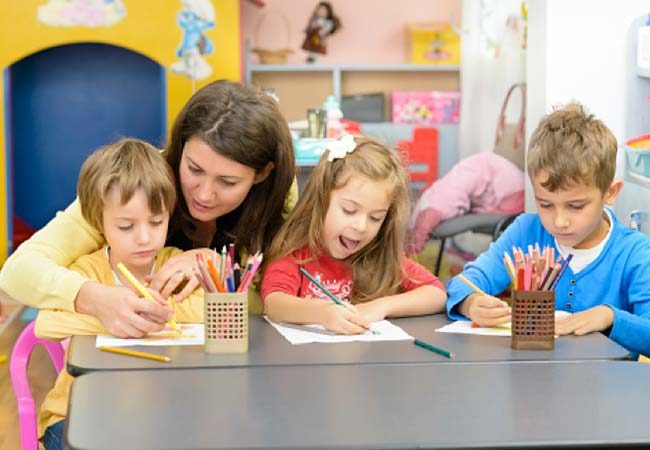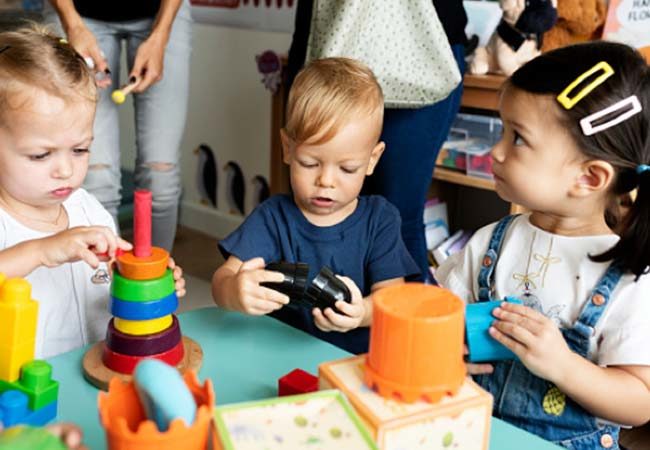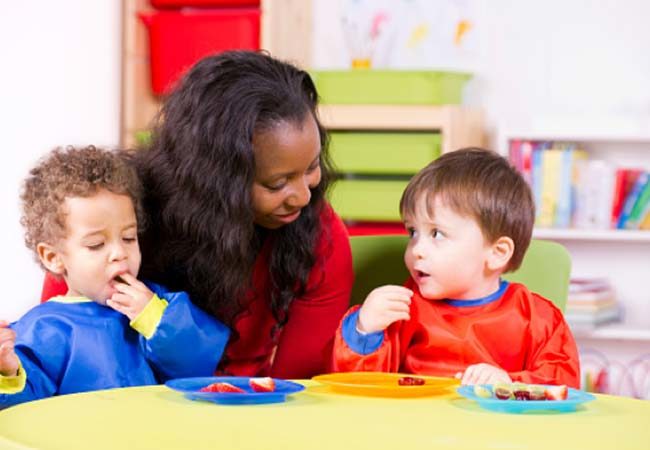
But, enrolling a child in daycare can certainly make sense for a number of valid reasons. It could be parents needing two incomes to get by financially, a single parent being stretched too thin, or simply the personal choice to balance work and home life.
All of these reasons are extremely common, and not something for parents to feel guilty about. In fact, it is shown that putting your child in daycare has a multitude of benefits that will help the entire family in the long run.
10 Benefits of Putting Your Child in Daycare
Here are proven benefits of putting your child in daycare:
1. Structured Schedule & Activities
Child care providers put a lot of effort into filling each day with engaging activities and opportunities for learning. Although young children may not be aware of time passing, having this kind of structure in their day benefits them in the long run as they will likely need to follow a similarly structured day throughout their time in grade school, camp, and more.
Having a set schedule is also reassuring to parents who have concerns about how a lack of structured time for eating, playing, and napping could negatively affect their child’s behavior by the end of the day and induce irritability.
2. Academic Advancement
In an extensive study by the U.S. National Institutes of Health, it was found that young children had greater academic achievement and higher cognitive ability as teens if they had spent time in high-quality daycare as young children.
Even better, daycare plays a role in likelihood of going to college. In a study led by the FPG Child Development Institute, it was found that infants enrolled in a high-quality childcare program were four times more likely to go on to earn a college degree, and accumulated significantly more years of total education than their peers.
For parents who are on the cusp of deciding to enroll their child in daycare, this statistic holds a lot of weight.
3. Socialization with Peers

While most parents are already arranging playdates for their child with cousins and neighbors, the social interactions children have with peers at daycare is equally important. For a young child in the early stages of growth, daycare is an opportunity to play and learn with other kids in a structured, supervised, and safe environment where they can learn life skills like how to share, problem-solve, and express kindness to others.
4. Parents Are More Likely to Participate at Their Kid’s School
Despite stereotypes about the working mom, it has been found that moms who’s children were cared for in daycare end up being more involved in their children’s school starting in Kindergarten. Even more so than the mothers who never enrolled their children in daycare. This participation includes everything from consistent communication with teachers, attending open houses, PTA meetings, and creating friendships with other parents.
5. Smoother Transition to Kindergarten
Daycare is an amazing way to prepare children for kindergarten where they will be expected to follow directions, get along with other children, and be away from their parents for an extended period of time.
Toddlers are at a critical age for brain development, and many daycare providers take advantage of this by structuring activities that stimulate learning. Children in daycare may have opportunities to learn things that other children are not – giving them a jumpstart to success in Kindergarten.
6. Helps Children Be More Well Behaved

Daycare is likely the first time that children have to follow directions from an adult who isn’t their mom or dad. This skill is critical and is one that they will have to practice throughout childhood.
Following directions isn’t an easy thing for some children, and the earlier they can practice the better off they will be. Let nervous parents know that children who attend daycare go on to have more social success – demonstrating better social skills and fewer peer-related difficulties in grade school.
7. Less Likely to Get Sick in Grade School
An unexpected benefit to daycare is that an earlier exposure to germs could help to improve a child’s immune system. The younger a child is exposed to germs and catches little colds here and there, the tougher a child’s immune system will be later down the road. So, let them get those ear infections out of their system now!
8. More Efficient Communicators
Something that a lot of parents worry about when they enroll their child in daycare is that if their child needs something, they won’t know how to advocate for themselves. Daycare can help with developing this skill.
Even something as simple as playing games with other children helps them learn a key part of effective communication – adjusting speech based on who they are talking to. Children will learn how to get along with other kids, ask to go to the bathroom when the need to, state which crayon they want, and more.
9. Helps Kids Try Healthier Foods

While many young children will act stubborn and picky about food at home, you’d be surprised how many have a change of heart once they are put in a new setting. Daycare can introduce children to new healthy snacks that they are more excited to try if they see their friends doing so too.
10. Happier Family
Maybe one of the greatest benefits of all is that daycare can make the entire family happier. Everyone knows that happy parents means happy kids, and if a parent is stretched too thin between working and taking care of the family, no one is benefitting.
Let parents know that they deserve to have ‘me time’ and they aren’t any less because of it. In fact, it’ll make them happier, more patient parents who can raise their kids to be the best they can be.
Final Thoughts
Is daycare the right decision for your child? It’s expected that this question will come up for parents contemplating their child care options.
Thankfully, due to numerous studies that have come out and the many happy families across the country who have expressed satisfaction in their choice, daycare continues to be an extremely beneficial option.
Learn more about Procare’s daycare solutions, and how they can improve your child care center.



